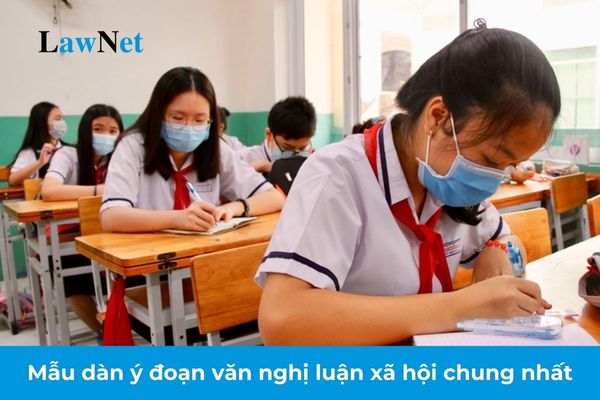Vietnam: What is the sample outline of a social argumentative paragraph for any topic? What are the language competencies required for 6th-grade students?
What is the sample outline of a social argumentative paragraph for any topic in Vietnam?
To effectively write a social argumentative paragraph, preparing the outline is crucial. A clear and comprehensive outline helps the writer to organize ideas coherently, ensuring that points are presented logically and persuasively.
Below is the sample outline of a social argumentative paragraph for any topic in Vietnam:
Introduction
– State the issue (opening sentence):
+ Lead into the topic – introduce the issue: Lead with a quote or directly state the topic required (usually a given issue in the Reading comprehension section).
+ Broad evaluation of the issue (positive, negative, etc.)
Body
– Develop the issue (express your thoughts – understanding of the argumentative topic)
+ Explain related concepts.
+ Discuss the issue: manifestations; effects, significance; counter-argument or expand the issue based on personal perspective.
+ Pose questions such as why, what for. Then, comment and prove each major and minor point, organizing arguments clearly.
+ Choose relevant, exemplary, concise, and accurate evidence.
+ Derive a lesson for oneself or relate to phenomena that directly affect or are similar to the subject.
Conclusion
– Conclude the issue (summarize the problem)
– Affirm the significance and topicality of the phenomenon.
Note: Information is for reference only.

What is the sample outline of a social argumentative paragraph for any topic in Vietnam? (Image from the Internet)
What are the language competencies required for 6th-grade students in Vietnam?
Under Section 4 of the General Education Program for Literature issued with Circular 32/2020/TT-BGDDT specifying language competencies required for 6th-grade students in Vietnam:
- Be able to use Vietnamese language knowledge along with personal experience and reasoning skills to understand texts; read texts by type and category; comprehend explicit and implicit content of texts.
- Identify and begin to analyze and evaluate the content and prominent features of expression forms in texts; compare different texts, relate them to personal life experiences; thereby developing personal perspectives, thoughts, and feelings about life to enrich spiritual life.
- Write narrative, descriptive, and expressive essays; begin to write argumentative, explanatory, everyday-life essays.
- Write narrative texts focusing on creatively retelling stories that have been read; events witnessed or participated in; imaginary stories combining descriptive and expressive elements.
- Write descriptive texts focusing on depicting activities (describing actions).
- Write expressive texts about scenes and people and express feelings about literary works; know how to compose poetry mainly to recognize characteristics of some familiar poetic forms.
- Write argumentative texts about issues needing personal thoughts and opinions, requiring relatively simple argumentative tasks with easily obtainable evidence.
- Write explanatory texts about familiar issues related to students' lives and understanding with a common structure.
- Fill in some forms, draft some everyday-life texts such as memos, emails, reports, advertisements, and interviews. Write following the correct procedure, know how to find resources to satisfy the writing task's requirements.
- Have an understanding of intellectual property rights and know how to cite texts properly.
- Present ideas and emotions clearly; maintain confidence when speaking in front of a group; use appropriate language and gestures when speaking; recount coherently stories read or heard; share emotions, attitudes, experiences, and ideas on discussed issues; discuss opinions on issues read or heard; explain an object or process; know how to tailor speech for purpose, audience, and context; use images, symbols, charts, etc., to present issues effectively.
- Listen with an appropriate attitude and summarize the content; identify and begin to evaluate the reasoning and evidence used by the speaker; recognize the speaker’s emotions; know how to effectively respond to what has been heard.
What are the perspectives on developing the Literature curriculum in Vietnam?
According to the General Education Program for Literature issued with Circular 32/2018/TT-BGDDT, perspectives on developing the Literature curriculum in Vietnam are as follows:
The Literature curriculum adheres to the basic regulations stated in the General Program while emphasizing several perspectives:
- The Literature curriculum is developed on theoretical and practical foundations, updates on research achievements in education, psychology, and teaching methodology of Vietnamese literature; achievements in literature and linguistics research; achievements in Vietnamese literature across various periods; experiences in developing Vietnamese literature curricula, particularly from the early 21st century until now, and international trends in curriculum development in general, and the Literature curriculum in particular over recent years, especially from developed countries; societal practice, education, economic conditions, and Vietnamese cultural tradition, especially the diversity of students in terms of regions, conditions, and learning abilities.
- The Literature curriculum focuses on training communication skills (reading, writing, speaking, and listening) as a central theme throughout all three education levels to meet the program's capacity-oriented direction and ensure coherence and continuity across all grades and levels. Fundamental, foundational knowledge about the Vietnamese language and literature is formed through activities in comprehending and creating texts; directly serving the requirement of training in reading, writing, speaking, and listening skills.
- The Literature curriculum is developed with an open approach, reflected in not specifying detailed teaching content but stipulating the outcomes needed in reading, writing, speaking, and listening for each grade; delineating some basic, core knowledge about the Vietnamese language, literature, and some texts with a significant, crucial position in national literature as mandatory content for students nationwide.
- The Literature curriculum meets both the innovation requirements and emphasizes inheriting and enhancing the strengths of existing Vietnamese literature curricula, especially the current one.

